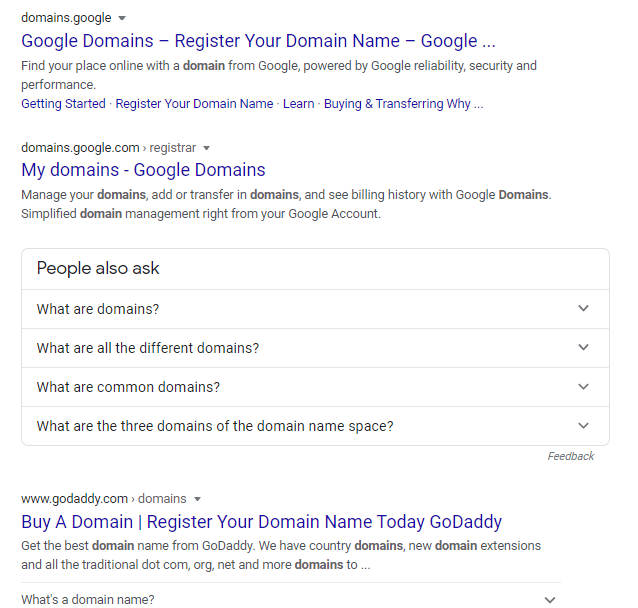From an innocuous beginning, Google has grown into a key competitor for retail domain name registrations.

I was in London in June 2014 at an ICANN meeting when the news broke: Google (NASDAQ: GOOGL) was becoming a domain name registrar.
Technically, Google had been a registrar for a long time. But it had never offered registrations to the public and instead partnered with other registrars to offer domains. Now it was going to sell directly to consumers.
As you can imagine, there was a lot of buzz at that ICANN meeting about Google’s entry into the market.
It wasn’t immediately clear what Google’s goal of entering the business was. This was the year new TLDs were rolling out, and I thought it might be connected to that. The message I was getting through backchannels was that this was another Google test venture. Throw spaghetti against the wall and see what sticks. After all, Google has tried and subsequently exited many businesses.
The markets were certainly concerned about the impact Google would have, though. Web.com’s stock was hammered on the news.
Google’s offering was, and still is, middle of the road.
Its pricing is simple and reasonable: $12 a year for .com, .net, or .org. It’s not the cheapest, but not expensive.
Its web interface is simple. That’s something customers appreciate, but it’s not unique to the domain industry.
Despite just being a decent domain registrar offering domains at reasonable prices, Google’s domains under management have steadily climbed. Less than four years after it entered the market, Google was a top 10 registrar for .com with 1.4 million domains registered. About 2 1/2 years later, it has 3.8 million .com domains under management.
So how did Google’s domain registrar, which is just middle-of-the-road, grow to siphon off so much from competitors?
I’d argue it’s all in the name.
As a former Google insider once told me, of course Google became a big registrar. If you’re searching for domain names and you’re sifting through registrars you’ve never heard of, but then see Google, of course you’ll choose the household name. You even have an account there already!
And Google had a great way to let people know that it offered domains. It started by advertising on Adwords…essentially taking cash out of one pocket and putting it in the other.
But shortly after Google launched Google Domains, the website at domains.google.com started to rank highly in search results. This seems at odds with everything Google says about search engine rankings. It’s on a subdomain, so it shouldn’t get link juice from the main Google.com domain. And Google certainly wasn’t an important site for domains at the time. Yet, it ranked well very quickly.
Today, using a clean browser and not logged in, Google ranks #1 and #2 for the term ‘domains’ on Google. It’s #1 for ‘domain’, ‘domain name’, and ‘domain names’.
So people search on Google for domain names. The first result is a company they already know and already have an account with.
That’s pretty compelling, and it’s no surprise that Google is now one of the top 10 domain name registrars.






The morning that domains.google launched, I search for “register a domain name” in Google. Not surprisingly the #1 ORGANIC result was domains.google while GoDaddy was #2. This was literally a few hours after the site was published. These results would have been impossible if Google played by their own rules.
Wise words. Some of us were commenting yesterday that Google only gets to continue with their monopoly actions due to the media hacks that run damage control for them, and how dnw has been part of that for years against our very interests in the domain industry. In a day we get to read it first hand. Predictable like clock work. Maybe more people will wake up soon to see who our real friends are. Braden is amazing thanks.
What is unclear is how successful all of those ads and high ranking have helped Google in domain registrations.
There is no breakdown of acquisition and my guess is most of the domain registrations are coming through the G Suite/ Workspace purchase path
Would be interesting to know how many Google domain registrations do not have a service attached to them
These are great questions. I feel like the registrations coming through search are probably significant. Wix has reported a substantial increase in marketing spend this year to capture more market. And I believe that the reason Web.com’s new registrations have dropped by 30k-50k per month is because they pulled back on search advertising for a while.
3.8 million registrations is 1% market share, I wouldn’t call that significant or a successful venture given the size of Google.
That’s .com, so it’s 2.5% of all .coms. As a percentage of new registrations it has even higher market share. It might not be a big line item to Google but it’s sizeable compared to many competing registrars.
Yet another example among many of Google (like Facebook) utilizing their enormous multiple-markets hegemony to become a big player in yet another industry / field.
Which is one the great reasons for the U.S. and over govs going after them (and Facebook).
• We interrupt this blog post for an important message:
“Yet Another Major Escalation In Establishment Internet Censorship”
https://caitlinjohnstone.substack.com/p/yet-another-major-escalation-in-establishment
where is Google in terms of national cctlds registration? only companies like 101, Marcaria, https://web-solutions.eu or https://interna.me count